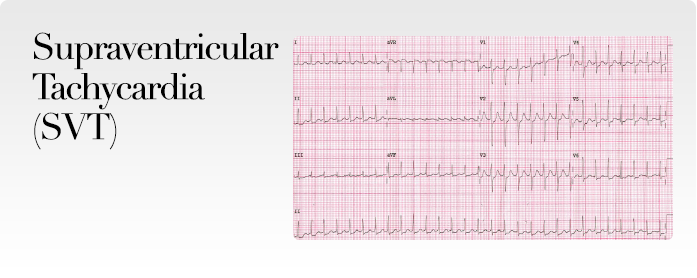| SVT is an arrhythmia involving the upper chambers of the heart. It causes palpitations lasting from minutes to hours. It occurs suddenly, and ends abruptly. It may be associated with giddiness, difficulty breathing or chest discomfort. Although it may be triggered by exercise, consumption of caffeine or alcohol, it may also occur without any provocation at all. Sometimes, the mere act of bending down to pick an object may start an episode. The episode may stop on its own, or it may go on until something is done. Maneuvers such as drinking ice cold water, pinching the nose and blowing hard with the mouth pursed, or putting up the legs may make the palpitations stop. Occasionally the episode is so persistent that medication by tablets or injection is required to stop it. |
|
| The condition is not life-threatening. However, if it occurs while the person is driving or operating machinery and is associated with giddiness or fainting, accidents could happen. It may present itself for the first time at any age and is usually recurrent. |
|
| Diagnosis is made on an ECG taken during an episode. Often the episode ends before the ECG is taken and hence the diagnosis is missed. If this is the case, an electrophysiological study is recommended to make the diagnosis. At the same time a catheter ablation procedure can be done to treat the condition. Besides catheter ablation, the other treatment is by drugs. However, the drugs only prevent the episodes but do not get rid of the cause. Some people may develop side effects from the drugs, such as giddiness, a low heart rate or low blood pressure. |





